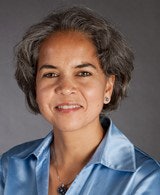 Marie Lynn Miranda
Marie Lynn MirandaAccess to higher education has been a critical part of the American fabric. Those who lead institutions of higher education have the unique opportunity “to look carefully at all the threads that are a part of that fabric and contribute toward strengthening what that fabric is able to do,” says Marie Lynn Miranda, who was named Rice University’s Howard R. Hughes Provost, effective July 1.
Her primary appointment will be in the Department of Statistics at Rice. Miranda’s parents were immigrants from Goa, a former Portuguese colony on the Indian subcontinent. Through her family, she saw the American dream realized through higher education at an early age. Her father came to the United States to attend school and became a professor at the University of Detroit. While caring for their children, her parents sponsored relatives to come to the U.S. to pursue their educational aspirations as well.
“They felt very strongly that education was how we became our best selves and was how we figured out how to serve the world,” she says. Miranda attended Duke University, where she studied mathematics—a field she was drawn to because of its philosophical and theoretical components. An interest in the human dimensions of environmental problems drove her to double major in economics.
In 1985, she graduated from Duke and continued to pursue economics at Harvard—an experience Miranda says proved to be challenging yet gratifying. “It was hard intellectually in a way that you felt great how it was making your brain work—like you can just feel yourself getting better at working on hard things,” she says.
Graduating in 1988, she continued at Harvard and received a Ph.D. in economics, where her dissertation focused on how economic and social policies affect positive land management decisions.
With a strong academic footing, Miranda realized that her research and skill set could have launched a career for her in a number of settings—government agencies, think tanks, consulting firms—but she chose to pursue a career in higher education.
In 1990, she joined the faculty at Duke University and spent years in various positions teaching and leading, first beginning as an assistant professor in public policy.
Over the course of 21 years at Duke, her greatest transition occurred when she became increasingly interested in how the environment shapes human health, especially for children. While considering a transition to the study of toxicology, Miranda also found herself at a critical moment in her personal life.
“All of a sudden, I had this very high bar that I needed my work to be because every hour that I spent at the office was an hour that I wasn’t spending with my kids, and so it had to be really meaningful work,” she says.
Engaging in projects around child lead exposure, Miranda became a self-taught toxicologist and, in 1999, joined Duke’s Integrated Toxicology and Environmental Health Program. She also became founding director of the Children’s Environmental Health Initiative.
In a time when the prevailing paradigm consisted of decontaminating environments after children were exposed to lead, Miranda sought a different approach in the initiative’s methods.
“Rather than using children as little biosensors in the environment, we were saying that you could actually use some really good quantitative analysis to figure out the places where children would most be at risk and go in and do something about it,” says Miranda.
Miranda’s work has garnered more than $50 million in grants, and the initiative’s research has been cited broadly, including in the U.S. Environmental Protection Agency’s integrated science assessment on revisions to the national ambient air quality standard for lead.
But producing data is the first step, she says. “The whole point of doing the research is trying to foster environments where children can prosper, so [that means] going beyond the research and saying what does this mean for policy. … Who do we need to make sure knows about this? … How should we be working directly in communities?”
In 2012, Miranda was named a professor and dean of the School of Natural Resources and Environment at the University of Michigan.
At the highest moment of her professional career, Miranda’s position as provost will allow her an opportunity to promote and support Rice’s academic, research, scholarly and creative programs and activities. She will work with the university leadership team and the broad Rice community as well as engage with the Houston community.
“Rice is a great place, and I have a lot to learn about the institution,” she says. “I hope to serve the university in a way that allows it to achieve its aspirations as one of the very best higher education institutions in the United States.”
Most of all, Miranda will continue to demonstrate that, with a strong educational background, a solid skill set and passion for change, one can strengthen the fabric of higher education and inspire those in reach of the American dream.





















